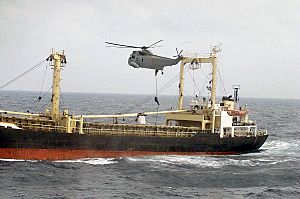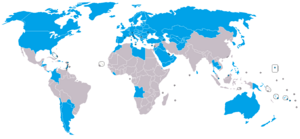Proliferation Security Initiative facts for kids
The Proliferation Security Initiative (PSI) is a worldwide effort. It helps stop the illegal movement of dangerous weapons, like weapons of mass destruction (WMD), and the parts used to make or deliver them. These weapons include things like nuclear, chemical, or biological weapons that can cause a lot of harm. The PSI works to prevent these items from reaching countries or groups that might use them to cause trouble.
The United States President, George W. Bush, started the PSI in May 2003 in Kraków, Poland. Since then, over 100 countries have joined, including Russia, Canada, the United Kingdom, Australia, France, Germany, Japan, and many others. Even though many countries support it, some, like India, China, and Indonesia, have not joined.
Contents
How the PSI Started
The idea for the PSI came about after a real-life event. In 2002, a ship from North Korea called the So San was stopped. It was carrying 15 Scud missiles and other materials, heading for Yemen. However, because of international laws at the time, the missiles could not be taken away. They had to be released.
This incident showed a gap in international law. It meant there was no easy way to stop dangerous weapons from being moved around the world. A few months later, in May 2003, President Bush announced the PSI. He did this with the President of Poland, Aleksander Kwaśniewski, in Kraków.
Early Days and Growth
When it first started, the PSI had 11 "core" countries. These included Australia, France, Germany, Japan, the Netherlands, Portugal, Spain, the United Kingdom, the US, and Poland. In September 2003, these countries created a document called the "Statement of Interdiction Principles." This document explained what the PSI would do. It said the goal was to stop shipments of WMD and related materials. It also stressed that any actions taken must follow international law.
Since 2003, the PSI has grown a lot. It now includes an "Operational Experts Group" (OEG) with 21 nations. Many other countries have also joined. Important trading nations like Singapore and the United Arab Emirates have endorsed the PSI. Countries like Turkey and the Republic of Korea, which are near places with weapon concerns, have also joined.
Agreements to Stop Ships
Eleven countries have special agreements with the United States. These are called "Mutual Shipboarding Agreements." They make it easier for ships from these countries to be boarded and checked if there's a concern. These countries include Antigua and Barbuda, the Bahamas, Belize, Croatia, Cyprus, Liberia, Malta, the Marshall Islands, Mongolia, Panama, and St. Vincent and the Grenadines. Many of these countries have a lot of commercial ships registered under their flags.
PSI's Continued Importance
In April 2009, President Barack Obama said he wanted to make the PSI a lasting international effort. This showed that the PSI was important to both political parties in the US. President Obama continued to support the PSI throughout his time in office.
In 2013, a big meeting helped the PSI countries agree on four main goals:
- Making sure the PSI stays strong.
- Improving ways to stop illegal shipments.
- Making laws stronger for taking action.
- Sharing information better.
These goals help countries work together to stop dangerous materials. The PSI has changed over time. It now deals with many issues related to stopping dangerous weapons. This includes checking customs, controlling exports, and stopping money that funds illegal activities. The PSI helps set important rules for keeping the world safer.
Who Participates in PSI
Countries that join the PSI agree to follow the "Statement of Interdiction Principles." Their main job is to stop dangerous weapons and materials. They are also encouraged to create laws that help them effectively stop and take these items. Finally, they must make sure their own facilities are not used to move illegal weapon shipments.
The PSI also helps countries connect and work together informally. This means they can cooperate even outside of official meetings. In the United States, the PSI program is managed by the White House. The United States Department of State and the United States Department of Defense play big roles in leading the effort.
PSI Activities and Members
PSI participants often take part in different activities. These include meetings, live exercises, and training sessions. These activities help them practice stopping WMD-related materials.
Current members of the PSI include:
- Afghanistan
- Albania
- Andorra
- Angola
- Antigua and Barbuda
- Argentina
- Armenia
- Australia
- Austria
- Azerbaijan
- Bahamas, The
- Bahrain
- Belarus
- Belgium
- Belize
- Benin
- Bosnia and Herzegovina
- Brunei Darussalam
- Bulgaria
- Cambodia
- Canada
- Chile
- Colombia
- Croatia
- Cyprus
- Czech Republic
- Denmark
- Djibouti
- Dominica
- Dominican Republic
- El Salvador
- Estonia
- Equatorial Guinea
- Fiji
- Finland
- France
- Federated States of Micronesia
- Georgia
- Germany
- Ghana
- Greece
- Holy See
- Honduras
- Hungary
- Iceland
- Iraq
- Ireland
- Israel
- Italy
- Japan
- Jordan
- Kazakhstan
- Korea, Republic of
- Kyrgyzstan
- Kuwait
- Latvia
- Liberia
- Libya
- Liechtenstein
- Lithuania
- Luxembourg
- Macedonia
- Madagascar
- Malaysia
- Malta
- Marshall Islands
- Moldova
- Mongolia
- Montenegro
- Morocco
- The Netherlands
- New Zealand
- Norway
- Oman
- Palau
- Panama
- Papua New Guinea
- Paraguay
- Philippines
- Poland
- Portugal
- Qatar
- Romania
- Samoa
- Saudi Arabia
- San Marino
- Serbia
- Singapore
- Slovakia
- Slovenia
- Spain
- Sri Lanka
- St. Lucia
- St. Vincent and the Grenadines
- Sweden
- Switzerland
- Tajikistan
- Thailand
- Togo
- Tunisia
- Turkey
- Turkmenistan
- Trinidad and Tobago
- Ukraine
- United Arab Emirates
- United Kingdom
- United States
- Uzbekistan
- Vanuatu
- Vietnam
- Yemen
- Zambia
Critical Capabilities and Practices (CCP)
PSI countries are developing a set of tools called Critical Capabilities and Practices (CCP). These tools help all PSI partners get better at stopping WMD. The CCP has four main parts:
- Element 1: Stopping Illegal Actions – Having the right laws to prevent illegal weapon activities within a country and across its borders.
- Element 2: Checking and Finding – Being able to effectively check cargo on planes, land, and ships to find dangerous materials.
- Element 3: Taking and Handling – Being able to properly take and get rid of illegal materials once they are found.
- Element 4: Quick Decisions – Making fast decisions so governments can respond quickly when they find illegal shipments.
These tools include things like example laws, guides to identify dangerous items, and training on how to inspect cargo. The CCP effort is led by a special team that helps gather resources and organize training events. Countries like Australia, Canada, France, Germany, Norway, Poland, Russia, and the United States are part of this team.
Stopping Illegal Shipments and Key Events
The PSI does not have one main office or leader. It is a political agreement and a flexible way for countries to work together. It always follows national and international laws. Countries involved in PSI work to have strong ways to stop illegal shipments, often with just two or three governments working together.
Here are some examples of events related to stopping illegal shipments:
- In December 2002, a Spanish ship, the SPS Navarra, stopped and boarded the freighter So San. This happened southeast of Yemen. The So San was from North Korea and was carrying 15 Scud missiles and other chemicals. Yemen said the cargo belonged to them, and the materials had to be returned. This event happened before the PSI officially started, but it was a big reason why the PSI was created.
- In September 2003, Germany learned that a ship called the BBC China was carrying nuclear-related materials to Libya. German experts, with help from the US Navy, inspected the ship in the Mediterranean Sea. They found that the ship's container number was fake. Germany took the nuclear equipment, which could be used to make centrifuges for nuclear weapons.
- In June 2009, a North Korean ship called the Kang Nam was believed to be going to Myanmar. The US Navy tracked it, and the ship turned around. After this, North Korea said it would take military action if its ships were searched.
- In September 2009, South Korea seized North Korean containers in the port of Busan. These containers had special clothing used to protect against chemical weapons.
- In December 2009, Thailand stopped a North Korean shipment of weapons and missile technology. This was based on information from US intelligence. The shipment was thought to be going to Iran or Pakistan.
- In June 2011, a North Korean ship called the MV Light was suspected of carrying missile technology to Myanmar. A US Navy ship, the USS McCampbell, stopped it. The ship refused to be boarded, even though its home country, Belize, had given permission. The ship was allowed to return to North Korea. Even though the materials were not inspected, the fact that they didn't reach their target was seen as a success for PSI.
Practice Exercises
PSI activities include regular "exercises." These are like practice drills that test how well countries can stop WMD-related materials. Exercises can be "live action," like practicing boarding ships or searching containers. They can also be "tabletop" activities, where experts discuss legal and operational questions using a made-up scenario.
Recent PSI exercises have included:
- PHOENIX EXPRESS 2012 (May): A US-led exercise in the Mediterranean Sea.
- PACIFIC SHIELD 2012 (July): An exercise hosted by Japan, focusing on air scenarios.
- PANAMAX 2012 (Aug): A joint US/Panama exercise.
- EASTERN ENDEAVOR 2012 (Sep): An exercise hosted by South Korea, focusing on maritime scenarios.
- Eastern European PSI Workshop (Nov 2012): Hosted by Moldova, focusing on land-based scenarios.
- LEADING EDGE 2013 (Feb): A joint UAE/US exercise with air, sea, and land activities.
- SAHARAN EXPRESS 2013 (Mar): A US-led exercise off the West Coast of Africa.
See also
- Container Security Initiative
- Global Initiative to Combat Nuclear Terrorism
- Nuclear proliferation
- Chemical, biological, radiological, and nuclear
- Global Trade Exchange
 | Precious Adams |
 | Lauren Anderson |
 | Janet Collins |



